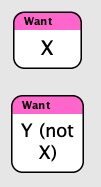His perspective is the exact opposite of what the ancients thought, as well as what SRS-abusing digital packrats think. (No judgement, I’m a reformed one.)
Why?
Too much work for too little reward.
My contention is that they each have their uses.
Instead, put a good PKM system first. Follow Tiago’s lead re: tagging, and use SRS + memory techniques as secondary tools.
Here's one use I’ve found for mnemonic devices as a secondary tool. They are great for capturing ideas + tasks when you don’t have a pen or smartphone, or can’t use one (when in conversation, or driving).
If anyone says X is a solution to Y problem for anyone and everyone ever, give what they say a try - but don’t believe them!














